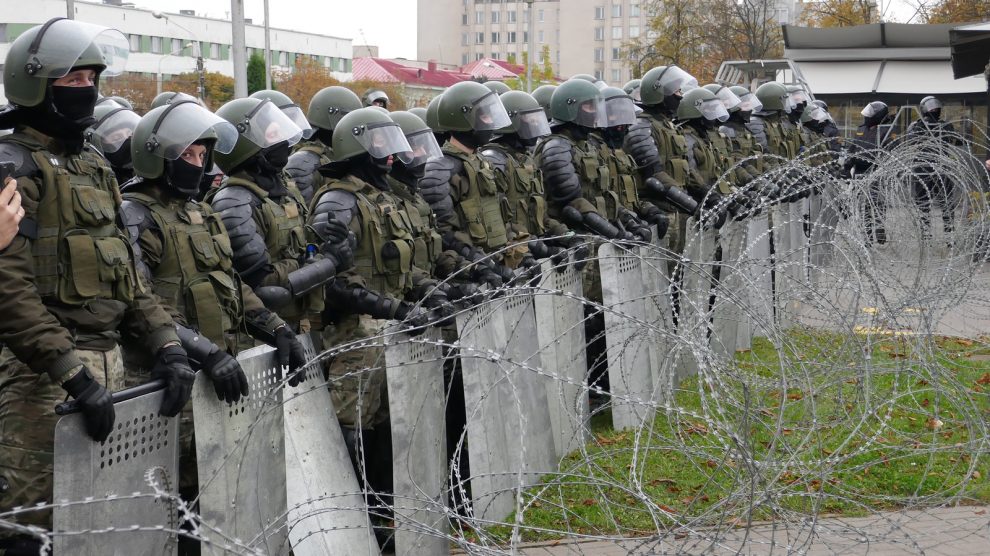Amid new arrests of peaceful demonstrators in Belarus, Amnesty International claims that the pursuit of justice in the country is “hopeless”.
A new report by Amnesty International has revealed how the Belarusian authorities have weaponised the justice system to punish victims of torture rather than perpetrators, as part of a widespread and brutal crackdown on protests that have been taking place since a rigged presidential election last August.
- Belarus opposition leader calls for international help to ensure her ‘safe’ return
- IIHF strips Belarus of right to co-host 2021 World Ice Hockey Championships
- Belarus faces increasing threats to financial stability
The country’s president, Alexander Lukashenko, claims to have won the election with 80 per cent of the vote, but by any objective measure the winner was the country’s main opposition candidate, Svetlana Tikhanovskaya, now living in exile in Lithuania.
On January 30, Mrs Tikhanovskaya was nominated for the Nobel Peace Prize by Lithuanian President Gitanas Nausėda for her courage to fight for free elections in her country.
New arrests
Fresh demonstrations on January 31 led to arrest of at least 160 demonstrators, including a Swiss journalist who was held in detention for several hours until the Swiss Embassy intervened to secure her release.
Thousands of others have not been so fortunate. According to Amnesty, the pursuit of justice inside Belarus in “hopeless”, and the organisation has called on the international community to take active steps to deliver justice for victims and hold perpetrators to account.
While Belarusian authorities have admitted receiving more than 900 complaints of abuses committed by police since demonstrations began, not one criminal investigation has been launched against law enforcement officers. In contrast, hundreds of criminal investigations have been opened against peaceful protesters, many of whom are victims of torture and ill-treatment.
“Since the start of post-election protests in Belarus, human rights groups have collected evidence of the torture of hundreds of peaceful protesters and documented the deaths of at least four. We have repeatedly called for effective investigations to bring those responsible to justice, but there is little hope of that from a system that not only protects police with anonymity, but also encourages intimidation and further violence against victims and witnesses,” says Marie Struthers, Amnesty International’s director for Eastern Europe and Central Asia.
“The total failure of the Belarusian justice system to ensure accountability means justice must now be pursued internationally. Governments, international and regional organisations should use all their leverage to pressure the Belarusian authorities to end this assault on human rights. We also urge the international community to take all available measures to deliver justice in Belarus.”
Harrowing accounts
In its new briefing, Belarus: “You are not Human Beings”, Amnesty International presents harrowing accounts of peaceful protesters being arresteden masse and subjected to torture, stripped naked, mercilessly beaten, held in stress positions, and deprived of food, drinking water or medical care for days.
During protests and in their aftermath, Belarusian law enforcement have used dozens of detention centres to arbitrarily detain peaceful protesters across the country, including the notorious Akrestsina facility in Minsk.
On the night of August 13-14, 2020, relatives of those detained at Akrestsina recorded the sounds of incessant beatings which were clearly audible in the street, and numerous voices screaming out in agony with some begging for mercy.
Tsimur (name changed), a 25-year-old doctor from Minsk, was arbitrarily arrested on 10 August 2020 and sent to Akrestsina. He told Amnesty International:
“Whoever cried, begged [the officers] not to beat them—they were beaten even worse.”
Mikalai (not his real name), who spent five days in police detention in the town of Orsha, described how together with other detainees he was told to walk through a “corridor” of some 50 police officers who beat them with truncheons. He suffered repeated blows to his head, and his legs turned blue from the blows he sustained.
The exact number of arbitrarily detained protesters who have passed through Akrestina and other detention facilities throughout Belarus remains unknown. But at the start of December 2020 it already exceeded 27,000 people, according to the UN High Commissioner for Human Rights. Arbitrary arrests have since continued.
One Akrestsina survivor told Amnesty International that, after she had managed to have her complaint registered and her injuries examined by an official medical forensic expert, she heard from the investigator that he would not start a formal investigation without an “order from above”.
Politically-motivated charges
Instead of ensuring the prosecution of those suspected of human rights violations, the Belarusian Prosecutor General reported on October 28, 2020 that 657 criminal cases had been opened against protesters with more than 200 individuals already charged with mass riots and violence against police officers. Civil society organisations have documented scores of cases against peaceful protesters opened under politically-motivated, trumped-up charges.
Belarus is bound by international law to uphold the human rights of all those on its territory, including ensuring the absolute prohibition of torture and investigating and sanctioning those responsible.
“The unprecedented scale of the ongoing human rights violations and the total impunity of the perpetrators at home necessitate the enactment or establishment of international mechanisms for investigation and prosecution,” says Struthers.
“The international community cannot stand by.”
Unlike many news and information platforms, Emerging Europe is free to read, and always will be. There is no paywall here. We are independent, not affiliated with nor representing any political party or business organisation. We want the very best for emerging Europe, nothing more, nothing less. Your support will help us continue to spread the word about this amazing region.
You can contribute here. Thank you.







Add Comment